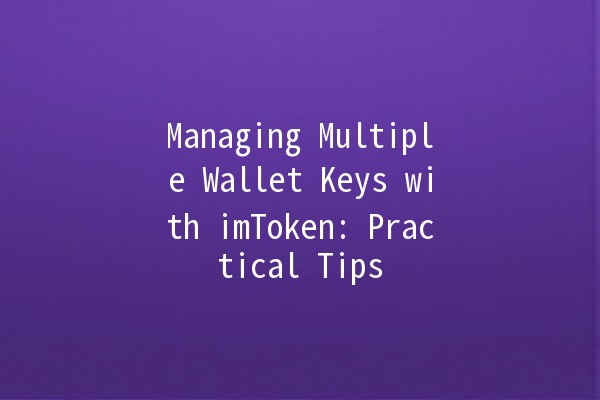In the digital age, cryptocurrency management is paramount for investors and enthusiasts alike. One of the leading platforms in this space is imToken, a multichain wallet that empowers users to manage various cryptocurrencies and tokens effectively. While imToken offers robust features, understanding how to manage multiple wallet keys within the application can significantly enhance both security and productivity. This article aims to provide you with valuable techniques and tips for managing your private keys across multiple wallets with imToken.
Before diving into strategies, it's essential to grasp what wallet keys are and their role in cryptocurrency security:
Private Key: This is akin to a password for your wallet. It grants access to your funds and allows you to sign transactions. Never share your private key.
Public Key: This is like your bank account number. It can be shared freely, enabling others to send you cryptocurrency without compromising your security.
By managing these keys wisely, you can protect your assets while maintaining easy access to your various wallets.

A password manager helps store private keys securely, making it easier to access them when needed.
Practical Usage: Store your imToken private keys (after creating backups) within a reliable password manager like LastPass or Bitwarden. This approach protects your keys with strong encryption while allowing quick access during transactions. Always enable twofactor authentication (2FA) for added security.
Enhanced Security: Protects against unauthorized access.
Convenience: Easily retrieve keys without having to memorize them.
Backups are critical for cryptocurrency management. Regularly backing up your wallet keys can prevent loss due to device failure or other unexpected issues.
Practical Usage: Periodically export your wallet’s private keys and save them in multiple secure locations—both online and offline. Consider using encrypted USB drives or cloud storage with strong security protocols to keep your backups safe.
Risk Mitigation: Ensures access to your funds even if your device is lost or damaged.
Peace of Mind: Knowing you have secured backups can alleviate anxiety over potential losses.
Managing multiple wallets can quickly lead to confusion. Organizing your wallets effectively will help you keep track of your assets and streamline your cryptocurrency transactions.
Practical Usage: Create a naming convention for your wallets based on purpose or the types of assets they hold (e.g., "Trading Wallet," "Longterm Holdings"). Utilize imToken’s label feature to categorize wallets, distinguishing between personal and businessrelated wallets.
Clarity and Efficiency: Improves transaction speed and reduces errors when managing multiple assets.
Timesaving: Quickly find the wallet you need without sifting through all your assets.
For extra security, consider utilizing multisignature (multisig) wallets. These wallets require multiple private keys to authorize a transaction.
Practical Usage: If you are managing a fund with partners, set up a multisignature wallet to require authorization from more than one keyholder. This setup ensures that no individual can unilaterally access or deplete the funds without agreement from others.
Increased Security: Reduces the risk of loss due to theft or misplaced keys.
Collaborative Management: Ideal for joint investments or family funds, fostering transparency among all parties.
Phishing attacks remain prevalent in the cryptocurrency space. Being educated about these threats can protect your wallet keys.
Practical Usage: Stay informed about the latest phishing techniques. Use official channels to verify communications regarding imToken and never click on suspicious links. Regularly check for updates from imToken and other reputable sources on potential scams.
Proactive Protection: Reduces the likelihood of falling victim to phishing scams.
Confidence: Enhances your ability to manage wallets, knowing you're equipped with knowledge to identify threats.
Losing your private key can be devastating as it often means losing access to your assets permanently. If you’ve backed up your key using a password manager, you can retrieve it from there. If not, your funds are likely irretrievable.
Storing keys on your mobile device can be risky if the device gets lost or infected with malware. It's advisable to use encrypted folders or secure password management apps designed specifically for storing sensitive information.
It’s advisable to change your private keys periodically, especially if you suspect any compromise. Regular updates enhance security, reducing the risk of unauthorized access.
Unfortunately, the public key cannot be used to access or recover funds. Only the private key grants that access, which is why it should be kept secured and confidential.
The best backup method combines both physical and digital storage. Use encrypted USB drives to store digital copies, and consider writing down your keys and storing them in a safe place offline.
Yes, services like imToken itself offer features for managing multiple wallets conveniently. Additionally, hardware wallets like Ledger or Trezor can also help manage multiple keys securely.
By implementing these practices, you can enhance your management of multiple wallet keys in imToken, improving both security and efficiency. Stay informed and proactive in your strategy to navigate the complexities of cryptocurrency management confidently. Use these tips not only to secure your investment but also to streamline your experience with managing various wallets and their keys effectively.